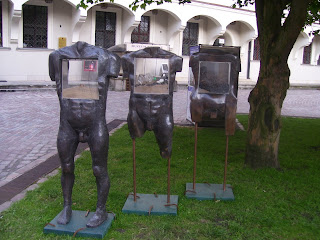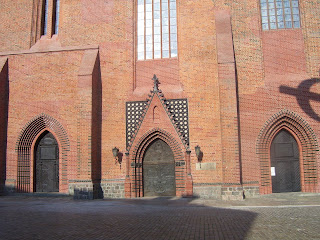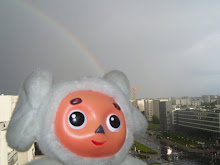This past weekend I went to Szczecin for a three-day trip which was bound to involve a lot of opera. Now, I'm not the hugest opera fan in the world, but I was especially invited to view the premiere of Piekna Helena at Opera na Zamku (The Opera in the Castle.) More details in the next post about that.
Artwork in the castle courtyard. In each chest there is sand with progressively more trash and pollution. As there is more pollution, the body changes until it becomes less defined and more 'mechanical' in a sense.
My road to Szczecin started at 10:45 in Warszawa Centralna. I bought my ticket with minutes to spare and hurried down to the platform where the waiting train was already boarding. Rushing through the cars, I found a cabin that was somewhat open. Inside, three men sat in a haze of cigarette smoke, one with a lit cigarette in his hand, obviously ignoring the No Smoking sign on the doorway, while the other two had their hands ever-ready on their darling packs of Marlboros. I sat down but only stayed a few minutes after I couldn't take the smell and the stinging in my eyes anymore. I grabbed my luggage and hunted for a new compartment.
The next one I found was peaceful an quiet with two men. I sat down between them (apparently the opposite bench was taken by women that were absent.) A young man to my right stared straight ahead while he shifted to make himself comfortable, while the older gentleman to my left (around sixty) listened to heavy metal on a Sony discman. The conductor came along and after looking at my ticket, promptly told me that I needed to move: these train cars were going to Zielona Gora, not to Szczecin. I asked which ones were going to Szczecin and he said to go three more wagons down.
I finally came to rest in a compartment with three gentlemen (one left in Poznan, I think) and tried my best to sleep. The sun does rise early in these summer days and I only managed about two hours of broken sleep before I arrived in Szczecin Glowny. Right before we did, we passed through some of the thickest fog I have ever seen. Outside the windows was pure white that reduced visibility to zero. From the main train station there was still some fog hanging over the water.
Morning fog from Szczecin Glowny (Stettin Hauptbahnhof.)
My time in Szczecin was limited, but enjoyable. I spent a great deal of time in the Zamek Ksiazat Pomorskich w Szecinie (The Pomeranian Dukes' Castle) and the Opera na Zamku (The Opera at the Castle), which is an opera company that operates out of the castle.
On Saturday, it was the last day of Dni Kultury Ukrainskiej (Days of Ukrainian Culture) at the castle. There was a large stage set up in the main courtyard, on which traditional Ukrainian folk dances and songs were performed. I only caught the tail end, but the performers' uniforms were terrific and hilarious. Also, I'm pretty sure that some of the songs they were singing are more of the 'Pop' category, and were not traditionally sung by Ukrainian peasants while harvesting their grain. One song that was absent from the performance was the fantastic Razom Nas Bahato, Nas Ne Podolaty.
Dances of Dni Kultury Ukrainskiej
Inside the castle, within the realm of the Opera, a restaurant called "Restauracja na Kuncu", which is a play on words, since the director of the Opera's last name is Kunc. It's a bit of fine dining; a place to go for a meal or coffee before the show, but it has reasonable prices. The prices were further reduced because everyone associated with the Opera gets half-off all dishes (something the owner resents.) Thus, with my indirect association I was able to dine there with a relatively small bill. Aside from the usual fare of typical Polish food, it offers some interesting additions. One such was the Salmon Tartare, a take on steak tartare (sans egg yolk) with salmon. I had it, and it was really good! Their pierogi are serviceable, but I've certainly had better; their sauces contain a distinct amount of cumin.
Sign for the restaurant in Opera na Zamku.
The clock tower at the Pomeranian Dukes' Castle.
I was given a restaurant and shopping guide by a member of the opera, which was more entertaining than it was valuable. Inside it boasts that Szczecin is now a major destination for plastic surgery (someone told me that many Germans cross over into it, not only for plastic surgery but things like dental care as well, because it's far cheaper than in Germany.) The part on plastic surgery is as follows:
Many new and modern clinics have opened within the last couple of years and most of the staff speak very good English. A typical stay for an operation can be as short as 2 or 3 days. There are great savings! For example a breast enhancement/reduction or liposuction (fat removal) is usually 50% cheaper in Poland than in many other Northern European countries.
How wonderful. The best part of the whole guide is the part on Szczecin's history. It's an interesting little blurb that conveniently fails to mention anything about Szczecin being a German (ethnicity-wise) city for something like 700 years.
Szczecin boasts over 1000-year and turbulent history [sic]. It was the ducal seat and a member of the Hanseatic League since the 13th century. The city was one of the most powerful ports and trading centres on the Baltic Sea. During World War II, 60% of all buildings were destroyed.
And that's about it for Szczecin's history. I guess it's enough for a small pamphlet. One thing that was interesting, is the amount of German tour groups visiting the area. The most that I saw were older people, and we joked that they were coming to say, "Hey! I grew up on this street. It sure looks a lot different than it did back then."
Artwork (graffiti?) on a stoop near the castle.
I should mention that Szczecin is a city dominated by brick architecture. If you love everything brick, there's plenty to see here. Marble may rule in Italy, and limestone in Western Europe, but here, brick is king. (Now, not every building is made out of brick, but all the older buildings and churches are.) Since Szczecin is known for its brickwork, many new buildings are cosmetically going with that theme and feature mainly brick facades. In some older buildings, Saint James' especially, it's easy to spot where the older brickwork has been replaced by newer bricks. I'm told the widespread use of brick is because there isn't much stone to quarry in Northern Europe. Since brick is basically dried mud and clay, which is in abundance, it found its way into being the premiere building material. They've certainly been creative with brick, and since brick goes so well with ivy, there's some ivy thrown in there as well.
The front facade and spire of St. James' Cathedral.
The beautiful main doors to the cathedral. You can see where the old brick has been replaced by new brick.
An entrance on the side of the cathedral. This side was currently undergoing renovation.
Typical brickwork.
While Szczecin is not really that big—much smaller than I thought—it does have its share of sights. Simply wandering about will do, but they also have a path painted throughout the city that goes by all the major sites. I more of ambled about, but it's impossible not to cross this path multiple times.
I was able to catch part of a fashion show at the central mall, Galaxy, and meander through the nearby Park Zeromskiego. There, it's a stroll to the banks of the Oder River. They were actually dredging the river, so we were able to see some huge backhoe dig up the mud and silt and deposit it in a barge (the barge with the backhoe was German flagged, while the accompanying barge was flew the Polish flag.) Actually, it was a very interesting process and attracted a small crowd.
Dredging the Oder River.
A few things I left unseen, one was the interior of the St. James' Cathedral and I dearly love climbing the spires (which I was unable to do.) When we went, there was a Mass, so we were not allowed in as tourists. There were the sort collection of museums that I didn't have a chance to peruse, but I'm sure I will if I go back. It may seem rather lame that I mainly dined at na Koncu, but remember, I'm on a budget here; I'll take half-off wherever I can get it.
I was also forced to deal with the frequent crap out of my digital camera. It's a junky point-and-shoot, but it usually gets the job done; however, recently it's decided to freeze when I least want it to and to refuse turning on randomly even if the batteries are fine. While my main camera, my Canon Elan 7ne is working well, it's a film camera so unless I scan my pictures (slides; I usually shoot on slide film), I can't upload them to here.
A great place to catch lunch is at Milk Bar Turysta. Jam-packed during the rush, it's worth it. Cheap with good food and large portions, it beats out most other places. I had a wonderful bowl of chlodnik, which was perfect to cool me down in the hot afternoon.
My meal at the milk bar.
When I left, I took the 11:15PM train back to Warsaw. This one didn't split up and I shared the cabin with two girls and a guy with acne scars so bad he looked like he had been burned with wax. He left (in Poznan also, I think) and was replaced by another girl later on in the trip. The seats smelled like dank sweat and we were near the bathroom, so we got that wonderful waft of shit and piss that hasn't been cleaned up since Stalin died. I got more sleep this time, but it was still cramped and the bathroom was revolting (piss all over the floor.) They seriously need to update these trains.
Three days, sun and rain, not bad.

























